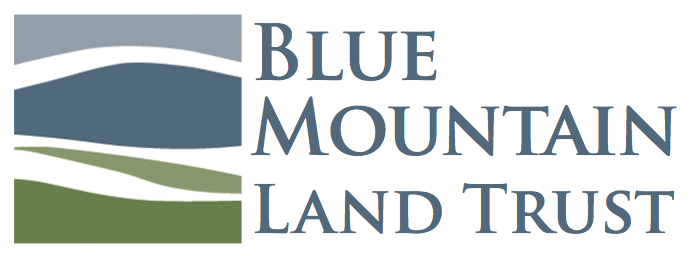September 4, 2015
Cunha Easement Adds 3,000 Acres in Union County to Blue Mountain Land Trust’s Conservation Portfolio
By Tom Reilly, Conservation Director
Imagine a place in the Blue Mountains where springs and streams run clear, cold, and pure. Where steelhead spawn and are reared along with juvenile Chinook salmon. Where elk live and roam almost year round. Where three miles of important tributaries to the Grande Ronde River are conserved in an undeveloped state forever. Where lack of development or subdivision provides spectacular scenic views of the surrounding mountains and countryside. The Cunha Ranch is just such a place, and it is now conserved forever by a conservation easement held by the Blue Mountain Land Trust.
Known officially as the Dark Canyon Conservation Easement, nearly 3,000 acres of a working cattle ranch is our latest conservation easement acquisition. The property is nestled in the foothills near Starkey, Oregon southwest of La Grande, where Meadow Creek enters the Grande Ronde River. The property contains two river miles of Dark Canyon Creek, a major tributary to Meadow Creek, one mile of which winds through the property. Over 250 acres of wetland and riparian habitat are found on the property. In addition to the abundance of natural resources, the property will remain in private hands as a working cattle ranch, providing economic benefit while remaining on the tax rolls of Union County.
The Dark Canyon easement meets many conservation values and public benefits important to the Blue Mountain Land Trust including:
- Preservation of juvenile rearing and migration of Snake River spring-summer Chinook salmon listed as threatened under the Endangered Species Act.
- Preservation of spawning and rearing habitat of threatened Snake River summer steelhead.
- Preservation of wildlife habitat including important big game winter range.
- Opportunity to protect and enhance water quality.
- Extinguishment of development rights on the property, thus preserving the scenic beauty and open space of the land by preventing subdivision, fragmentation of habitat, and development.
- Protection of the property from intensive grazing; timber harvest except for forest health and improvement of habitat; stream channelization; or road construction.
The landowners retained a 3-1/2 acre building site on the property for a single residence but no development or construction will be allowed on the rest of the land.
Partners in this project include the Bonneville Power Administration (BPA), which funded the acquisition, and the Confederated Tribes of the Umatilla Indian Reservation (CTUIR), which identified the project opportunity and initiated the acquisition and brought in Blue Mountain Land Trust in 2013 to complete the transaction.
The funding was committed by BPA for use by the CTUIR in the 2008 Columbia Basin Fish Accords Memorandum of Agreement between the Three Treaty Tribes and the Federal Columbia River Power System Action Agencies for the benefit of fish and wildlife. Both BPA and the CTUIR retain rights of enforcement of the easement, and the easement will be held in perpetuity by the Blue Mountain Land Trust.
BMLT assumes long term stewardship and defense of this easement, and will conduct annual monitoring to ensure that the conservation easement is followed as agreed by the landowners.
Current property owners Joe and Patti Cunha are excited to be partners in conservation. As Patti is fond of saying, “everything the land trust wants for the property we want as land owners.” The property has been in the Cunha family for generations.
The original Cunha family ranch encompassed 12,000 acres in the Grande Ronde Valley. Joe Cunha is the last family member owning part of the original ranch. In recent decades nearby ranches have been sold and subdivided. Land use in the area has been transitioning from ranching to residential/recreational.
The Cunhas want to keep the property in the family and to continue its traditional use for well-managed cattle grazing during summer months and for fishing, hunting, and overall enjoyment year round.
This acquisition marks a major milestone for the Blue Mountain Land Trust. For years we have wanted to acquire conservation properties in Oregon to fulfill our commitment to the two states we serve. Our first success is a major one in furthering our mission.
This project came about through a solid collaborative working relationship with a major conservation partner, the Confederated Tribes of the Umatilla Indian Reservation. And this property certainly represents the scenic, natural, and working lands that characterize our region.
With this acquisition, our twelfth conservation easement, we now have stewardship of 3,800 acres of land in two states!




